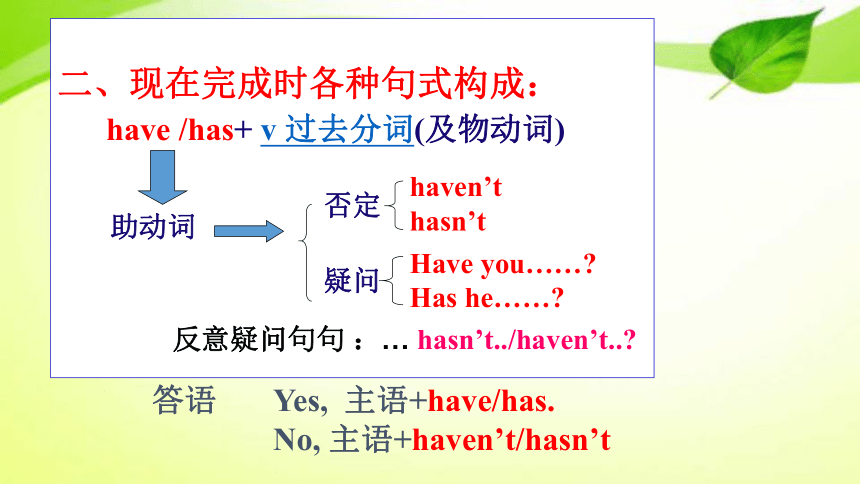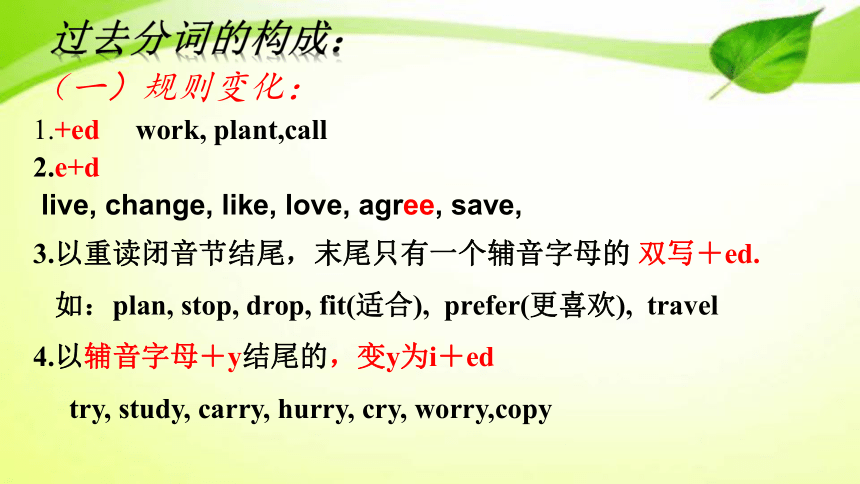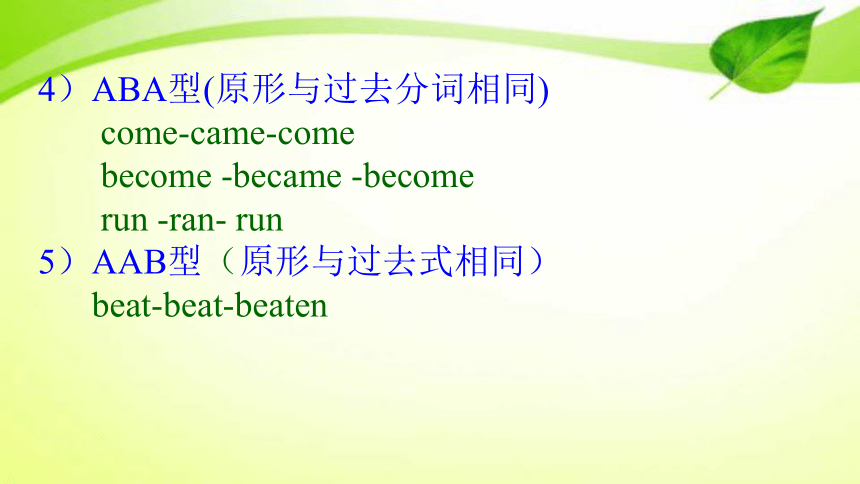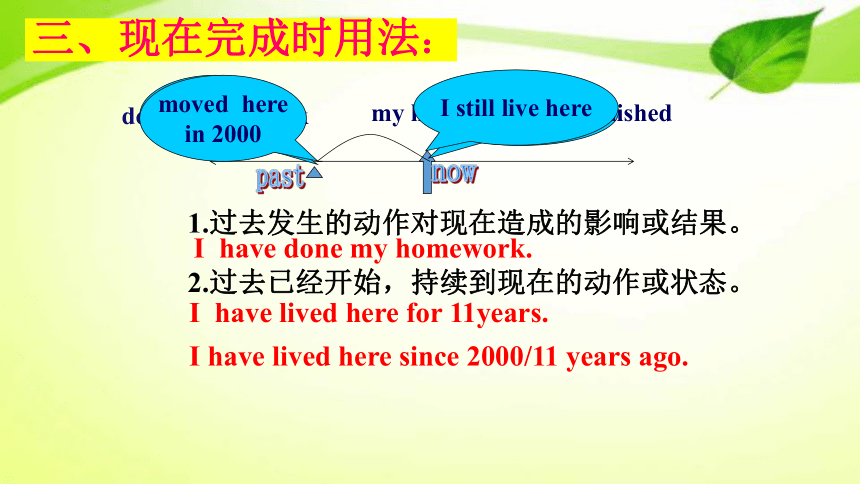外研版九年级上册现在完成时态专项复习课件(19张)
文档属性
| 名称 | 外研版九年级上册现在完成时态专项复习课件(19张) |  | |
| 格式 | zip | ||
| 文件大小 | 301.8KB | ||
| 资源类型 | 教案 | ||
| 版本资源 | 通用版 | ||
| 科目 | 英语 | ||
| 更新时间 | 2020-06-22 13:35:58 | ||
图片预览







文档简介
(共19张PPT)
The
Present
Perfect
Tense
现在完成时态
Winter
has
already
come.Will
it
still
be
far
in
spring?
冬天来了,春天还会远吗?
一、基本结构:
have/has+过去分词(done)
二、现在完成时各种句式构成:
have
/has+
v
过去分词(及物动词)
助动词
否定
haven’t
hasn’t
疑问
Have
you……?
Has
he……?
答语
Yes,
主语+have/has.
No,
主语+haven’t/hasn’t
反意疑问句句
:…
hasn’t../haven’t..?
过去分词的构成:
(一)规则变化:
1.+ed
work,
plant,call
2.e+d
live,
change,
like,
love,
agree,
save,
3.以重读闭音节结尾,末尾只有一个辅音字母的
双写+ed.
如:plan,
stop,
drop,
fit(适合),
prefer(更喜欢),
travel
4.以辅音字母+y结尾的,变y为i+ed
try,
study,
carry,
hurry,
cry,
worry,copy
(二)不规则动词:原形-过去式-过去分词形式
1)
AAA型(三种都一样)
cost
-cost
-cost
cut-
cut
-cut
hurt
-hurt
-hurt
2)ABB型(过去式与过去分词相同)
bring-brought-brought
catch-
caught
-caught
lead
-led
-led
3)
ABC型(三种都不一样)
begin-began-begun
grow-
grew-
grown
4)ABA型(原形与过去分词相同)
come-came-come
become
-became
-become
run
-ran-
run
5)AAB型(原形与过去式相同)
beat-beat-beaten
1.过去发生的动作对现在造成的影响或结果。
2.过去已经开始,持续到现在的动作或状态。
do
my
homework
I
have
done
my
homework.
my
homework
have
finished
moved
here
in
2000
I
still
live
here
I
have
lived
here
for
11years.
I
have
lived
here
since
2000/11
years
ago.
past
now
三、现在完成时用法:
现在完成时时态用法一:
1.现在完成时用来表示过去发生或已完成的动作或状态对现在造成的影响或结果,也就是说,动作或状态发生在过去但它的影响现在还存在。
I
lost
my
wallet
yesterday.
I
have
lost
my
wallet.
(含义是:现在我没有钱花了.)
Jane
had
breakfast
ten
minutes
ago.
Jane
has
just
had
breakfast.
(含义是:简现在不饿了.)
He
opened
the
door
just
now
.
He
has
opened
the
door.
(含义是:现在门是开着的)
2.常用标志词:
already(肯定句)
yet(否定句和疑问句
句末)
never(否定句)ever
just
before(句末)so
far,
these
days,
1.She
has
not
seen
this
film
.
She
has
seen
this
film.
2.I
have
combed
my
hair.
Have
you
combed
your
hair
.
3.He
has
watched
a
video.
He
has
not
watched
a
video
.
already
----------
yet
已经
用于肯定句
用于否定句,疑问句
yet
already
already
yet
yet
already
3.对点练习:
1.
I
________
(do)
my
homework
already.
2.
He
_____________(not
finished)
his
homework
yet.
3.
_______you
ever
______
(be)
to
Haiwaii?
4.
We
______
never
______
(see)
such
an
exciting
match
before.
5.Mother
_____
just
_______(clean)
the
house.
Please
don’t
come
in.
6.They
_________________(practice)
this
dialogue
twice.
have
done
has
not
finished
Have
been
have
seen
has
cleaned
have
practiced
1.
have
been
to
+地名,
“曾经去过某地”,
人已回来
They
have
been
to
Beijing
twice.
2.
have
gone
to
+地点,
“去了某地”,
人未回来
They
have
gone
to
Beijing.
3.
have
been
in
+地点,
“在某地待了多久”,可以和时间段连用
They
have
been
in
Beijing
for
10
years.
4.【特殊句型要牢记】
用have
/has
been
to和have
/
has
gone
to
have
been
in
填空
1.Lucy
has
been
to
the
Great
Wall
twice.
2.—
What
about
your
sister,Lily?
—
Oh,she
Chengdu,
she
will
come
back
next
week.
3.The
Blacks
have
been
in
China
for
two
years.
has
gone
to
现在完成时时态用法二:
过去发生的动作持续到现在有可能还要继续持续,常常和since或for构成的时间状语连用。
since+时间点/从句(一般过去时态)
for+一段时间
e.g.I
have
learned
English
for
one
year./since
last
year/since
I
was
a
child
.
用
for和
since填空:
___for__a
week
_for__a
long
time
__since__1997
since
two
weeks
ago
___for_three
years
__since
last
month
I
haven’t
seen
him
__A___
1992.
A.
since
B.
for
C.
ago
D.
before
2.
My
uncle
has
worked
in
this
hospital
__A___.
A.
for
ten
years
B.ten
years
ago
C.since
ten
years
3.
Miss
Gao
isn’t
here.
She
__B_
to
the
station
to
meet
Mr
Brown.
A.went
B.
has
gone
C.
would
go
D.
has
been
4.
Lucy
and
Lily
can
speak
good
Chinese,
because
they
A_
China
for
six
years.
A.have
been
in
B.
have
been
to
C.
have
come
to
D.have
gone
to
5.
---I
have
finished
my
homework?
---when
_C_
you
_____
it?
A.
have;
finished
B.do;
finish
C.did;
finish
D.will;
finish
【温馨提示】:
英语中的动词分为延续性和非延续性两种,
在现在完成时中,
有时要将这类非延续性动词转换为延续性动词,
这样才能和时间段(for
和since)连用。转换方法有:
?
1.
将短暂性动词转化为“be
+
名词/形容词或副词/介词短语”,
这样才能和时间段连用。请看下表:
?
begin
(start)→be
on
go
there
→be
there
come
back
→be
back
come
here→
be
here
open→
be
open
close
→
be
closed
die
→
be
dead
marry→
be
married
finish→
be
over
go
to
bed
→
be
in
bed
leave→
be
away
return
→be
back
get
out
→be
out
fall
asleep→
be
asleep
lose
→be
lost
fall
ill→
be
ill
get(arrive,
reach)
→be
in/at
join(become)→
be
in/
be
a
member
of
例如:
这个老人去世10年了。
( × )The
old
man
has
died
for
10
years.
?
( √ )The
old
man
has
been
dead
for
10
years.
2.有的短暂性动词可以转化为意思相同的延续性动词。请看下表:
borrow
→keep(借)
put
on→
wear/be
on
(穿)
become
→be
(成为)
get
to
know→
know(认识)
buy→
have(own)
(买)
catch
a
cold→
have
a
cold
(感冒)
receive→
have
(收到)
go
to
sleep→
sleep(睡觉)
例如:
这本书我借了一个月了。
( ×
)
I
have
borrowed
that
book
for
one
month.
?
( √ )
I
have
kept
that
book
for
one
month.
?
Summarise:
1.现在完成时态的结构和各种句式变化。
2.现在完成时态的两种用法。
3.短暂动词转换为延续性的常见方式。
Thank
you
!
The
Present
Perfect
Tense
现在完成时态
Winter
has
already
come.Will
it
still
be
far
in
spring?
冬天来了,春天还会远吗?
一、基本结构:
have/has+过去分词(done)
二、现在完成时各种句式构成:
have
/has+
v
过去分词(及物动词)
助动词
否定
haven’t
hasn’t
疑问
Have
you……?
Has
he……?
答语
Yes,
主语+have/has.
No,
主语+haven’t/hasn’t
反意疑问句句
:…
hasn’t../haven’t..?
过去分词的构成:
(一)规则变化:
1.+ed
work,
plant,call
2.e+d
live,
change,
like,
love,
agree,
save,
3.以重读闭音节结尾,末尾只有一个辅音字母的
双写+ed.
如:plan,
stop,
drop,
fit(适合),
prefer(更喜欢),
travel
4.以辅音字母+y结尾的,变y为i+ed
try,
study,
carry,
hurry,
cry,
worry,copy
(二)不规则动词:原形-过去式-过去分词形式
1)
AAA型(三种都一样)
cost
-cost
-cost
cut-
cut
-cut
hurt
-hurt
-hurt
2)ABB型(过去式与过去分词相同)
bring-brought-brought
catch-
caught
-caught
lead
-led
-led
3)
ABC型(三种都不一样)
begin-began-begun
grow-
grew-
grown
4)ABA型(原形与过去分词相同)
come-came-come
become
-became
-become
run
-ran-
run
5)AAB型(原形与过去式相同)
beat-beat-beaten
1.过去发生的动作对现在造成的影响或结果。
2.过去已经开始,持续到现在的动作或状态。
do
my
homework
I
have
done
my
homework.
my
homework
have
finished
moved
here
in
2000
I
still
live
here
I
have
lived
here
for
11years.
I
have
lived
here
since
2000/11
years
ago.
past
now
三、现在完成时用法:
现在完成时时态用法一:
1.现在完成时用来表示过去发生或已完成的动作或状态对现在造成的影响或结果,也就是说,动作或状态发生在过去但它的影响现在还存在。
I
lost
my
wallet
yesterday.
I
have
lost
my
wallet.
(含义是:现在我没有钱花了.)
Jane
had
breakfast
ten
minutes
ago.
Jane
has
just
had
breakfast.
(含义是:简现在不饿了.)
He
opened
the
door
just
now
.
He
has
opened
the
door.
(含义是:现在门是开着的)
2.常用标志词:
already(肯定句)
yet(否定句和疑问句
句末)
never(否定句)ever
just
before(句末)so
far,
these
days,
1.She
has
not
seen
this
film
.
She
has
seen
this
film.
2.I
have
combed
my
hair.
Have
you
combed
your
hair
.
3.He
has
watched
a
video.
He
has
not
watched
a
video
.
already
----------
yet
已经
用于肯定句
用于否定句,疑问句
yet
already
already
yet
yet
already
3.对点练习:
1.
I
________
(do)
my
homework
already.
2.
He
_____________(not
finished)
his
homework
yet.
3.
_______you
ever
______
(be)
to
Haiwaii?
4.
We
______
never
______
(see)
such
an
exciting
match
before.
5.Mother
_____
just
_______(clean)
the
house.
Please
don’t
come
in.
6.They
_________________(practice)
this
dialogue
twice.
have
done
has
not
finished
Have
been
have
seen
has
cleaned
have
practiced
1.
have
been
to
+地名,
“曾经去过某地”,
人已回来
They
have
been
to
Beijing
twice.
2.
have
gone
to
+地点,
“去了某地”,
人未回来
They
have
gone
to
Beijing.
3.
have
been
in
+地点,
“在某地待了多久”,可以和时间段连用
They
have
been
in
Beijing
for
10
years.
4.【特殊句型要牢记】
用have
/has
been
to和have
/
has
gone
to
have
been
in
填空
1.Lucy
has
been
to
the
Great
Wall
twice.
2.—
What
about
your
sister,Lily?
—
Oh,she
Chengdu,
she
will
come
back
next
week.
3.The
Blacks
have
been
in
China
for
two
years.
has
gone
to
现在完成时时态用法二:
过去发生的动作持续到现在有可能还要继续持续,常常和since或for构成的时间状语连用。
since+时间点/从句(一般过去时态)
for+一段时间
e.g.I
have
learned
English
for
one
year./since
last
year/since
I
was
a
child
.
用
for和
since填空:
___for__a
week
_for__a
long
time
__since__1997
since
two
weeks
ago
___for_three
years
__since
last
month
I
haven’t
seen
him
__A___
1992.
A.
since
B.
for
C.
ago
D.
before
2.
My
uncle
has
worked
in
this
hospital
__A___.
A.
for
ten
years
B.ten
years
ago
C.since
ten
years
3.
Miss
Gao
isn’t
here.
She
__B_
to
the
station
to
meet
Mr
Brown.
A.went
B.
has
gone
C.
would
go
D.
has
been
4.
Lucy
and
Lily
can
speak
good
Chinese,
because
they
A_
China
for
six
years.
A.have
been
in
B.
have
been
to
C.
have
come
to
D.have
gone
to
5.
---I
have
finished
my
homework?
---when
_C_
you
_____
it?
A.
have;
finished
B.do;
finish
C.did;
finish
D.will;
finish
【温馨提示】:
英语中的动词分为延续性和非延续性两种,
在现在完成时中,
有时要将这类非延续性动词转换为延续性动词,
这样才能和时间段(for
和since)连用。转换方法有:
?
1.
将短暂性动词转化为“be
+
名词/形容词或副词/介词短语”,
这样才能和时间段连用。请看下表:
?
begin
(start)→be
on
go
there
→be
there
come
back
→be
back
come
here→
be
here
open→
be
open
close
→
be
closed
die
→
be
dead
marry→
be
married
finish→
be
over
go
to
bed
→
be
in
bed
leave→
be
away
return
→be
back
get
out
→be
out
fall
asleep→
be
asleep
lose
→be
lost
fall
ill→
be
ill
get(arrive,
reach)
→be
in/at
join(become)→
be
in/
be
a
member
of
例如:
这个老人去世10年了。
( × )The
old
man
has
died
for
10
years.
?
( √ )The
old
man
has
been
dead
for
10
years.
2.有的短暂性动词可以转化为意思相同的延续性动词。请看下表:
borrow
→keep(借)
put
on→
wear/be
on
(穿)
become
→be
(成为)
get
to
know→
know(认识)
buy→
have(own)
(买)
catch
a
cold→
have
a
cold
(感冒)
receive→
have
(收到)
go
to
sleep→
sleep(睡觉)
例如:
这本书我借了一个月了。
( ×
)
I
have
borrowed
that
book
for
one
month.
?
( √ )
I
have
kept
that
book
for
one
month.
?
Summarise:
1.现在完成时态的结构和各种句式变化。
2.现在完成时态的两种用法。
3.短暂动词转换为延续性的常见方式。
Thank
you
!
同课章节目录
- 词法
- 名词
- 动词和动词短语
- 动词语态
- 动词时态
- 助动词和情态动词
- 非谓语动词
- 冠词
- 代词
- 数词和量词
- 形容词副词及其比较等级
- 介词和介词短语
- 连词和感叹词
- 构词法
- 相似、相近词比较
- 句法
- 陈述句
- 一般疑问句和否定疑问句
- 特殊疑问句及选择疑问句
- 反意疑问句
- 存在句(There be句型)
- 宾语从句
- 定语从句
- 状语从句
- 主谓一致问题
- 简单句
- 并列句
- 复合句
- 主谓一致
- 主、表语从句
- 名词性从句
- 直接引语和间接引语
- 虚拟语气
- 感叹句
- 强调句
- 倒装句
- 祈使句
- 句子的成分
- 句子的分类
- 题型专区
- 单项选择部分
- 易错题
- 完形填空
- 阅读理解
- 词汇练习
- 听说训练
- 句型转换
- 补全对话
- 短文改错
- 翻译
- 书面表达
- 任务型阅读
- 语法填空
- 其他资料
